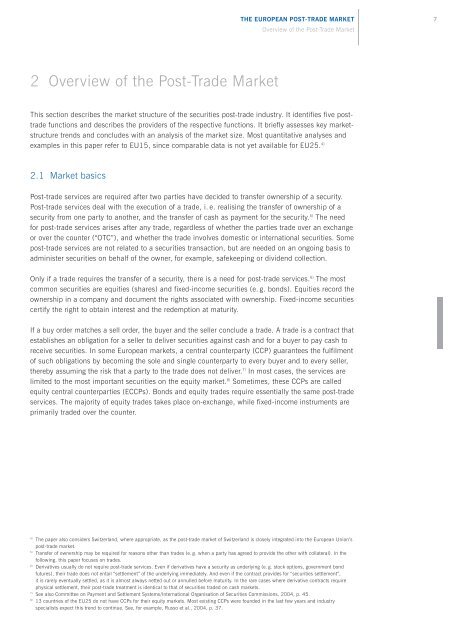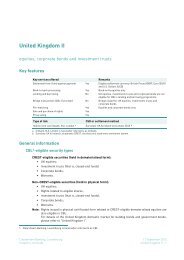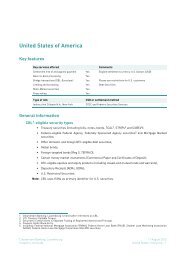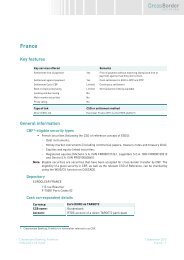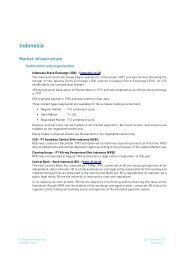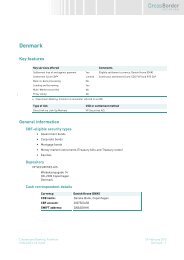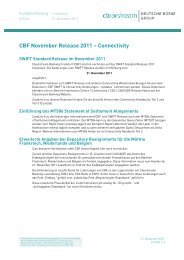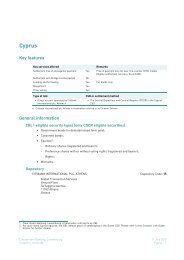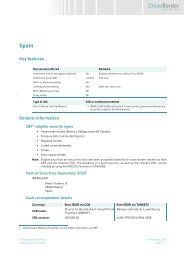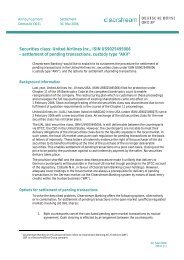An introduction to the European Post-Trade Market - Clearstream
An introduction to the European Post-Trade Market - Clearstream
An introduction to the European Post-Trade Market - Clearstream
You also want an ePaper? Increase the reach of your titles
YUMPU automatically turns print PDFs into web optimized ePapers that Google loves.
2 Overview of <strong>the</strong> <strong>Post</strong>-<strong>Trade</strong> <strong>Market</strong><br />
This section describes <strong>the</strong> market structure of <strong>the</strong> securities post-trade industry. It identifies five posttrade<br />
functions and describes <strong>the</strong> providers of <strong>the</strong> respective functions. It briefly assesses key marketstructure<br />
trends and concludes with an analysis of <strong>the</strong> market size. Most quantitative analyses and<br />
examples in this paper refer <strong>to</strong> EU15, since comparable data is not yet available for EU25. 4)<br />
2.1 <strong>Market</strong> basics<br />
THE EUROPEAN POST-TRADE MARKET<br />
Overview of <strong>the</strong> <strong>Post</strong>-<strong>Trade</strong> <strong>Market</strong><br />
<strong>Post</strong>-trade services are required after two parties have decided <strong>to</strong> transfer ownership of a security.<br />
<strong>Post</strong>-trade services deal with <strong>the</strong> execution of a trade, i. e. realising <strong>the</strong> transfer of ownership of a<br />
security from one party <strong>to</strong> ano<strong>the</strong>r, and <strong>the</strong> transfer of cash as payment for <strong>the</strong> security. 5) The need<br />
for post-trade services arises after any trade, regardless of whe<strong>the</strong>r <strong>the</strong> parties trade over an exchange<br />
or over <strong>the</strong> counter (“OTC”), and whe<strong>the</strong>r <strong>the</strong> trade involves domestic or international securities. Some<br />
post-trade services are not related <strong>to</strong> a securities transaction, but are needed on an ongoing basis <strong>to</strong><br />
administer securities on behalf of <strong>the</strong> owner, for example, safekeeping or dividend collection.<br />
Only if a trade requires <strong>the</strong> transfer of a security, <strong>the</strong>re is a need for post-trade services. 6) The most<br />
common securities are equities (shares) and fixed-income securities (e. g. bonds). Equities record <strong>the</strong><br />
ownership in a company and document <strong>the</strong> rights associated with ownership. Fixed-income securities<br />
certify <strong>the</strong> right <strong>to</strong> obtain interest and <strong>the</strong> redemption at maturity.<br />
If a buy order matches a sell order, <strong>the</strong> buyer and <strong>the</strong> seller conclude a trade. A trade is a contract that<br />
establishes an obligation for a seller <strong>to</strong> deliver securities against cash and for a buyer <strong>to</strong> pay cash <strong>to</strong><br />
receive securities. In some <strong>European</strong> markets, a central counterparty (CCP) guarantees <strong>the</strong> fulfilment<br />
of such obligations by becoming <strong>the</strong> sole and single counterparty <strong>to</strong> every buyer and <strong>to</strong> every seller,<br />
<strong>the</strong>reby assuming <strong>the</strong> risk that a party <strong>to</strong> <strong>the</strong> trade does not deliver. 7) In most cases, <strong>the</strong> services are<br />
limited <strong>to</strong> <strong>the</strong> most important securities on <strong>the</strong> equity market. 8) Sometimes, <strong>the</strong>se CCPs are called<br />
equity central counterparties (ECCPs). Bonds and equity trades require essentially <strong>the</strong> same post-trade<br />
services. The majority of equity trades takes place on-exchange, while fixed-income instruments are<br />
primarily traded over <strong>the</strong> counter.<br />
4) The paper also considers Switzerland, where appropriate, as <strong>the</strong> post-trade market of Switzerland is closely integrated in<strong>to</strong> <strong>the</strong> <strong>European</strong> Union’s<br />
post-trade market.<br />
5) Transfer of ownership may be required for reasons o<strong>the</strong>r than trades (e. g. when a party has agreed <strong>to</strong> provide <strong>the</strong> o<strong>the</strong>r with collateral). In <strong>the</strong><br />
following, this paper focuses on trades.<br />
6) Derivatives usually do not require post-trade services. Even if derivatives have a security as underlying (e. g. s<strong>to</strong>ck options, government bond<br />
futures), <strong>the</strong>ir trade does not entail “settlement” of <strong>the</strong> underlying immediately. <strong>An</strong>d even if <strong>the</strong> contract provides for “securities settlement”,<br />
it is rarely eventually settled, as it is almost always netted out or annulled before maturity. In <strong>the</strong> rare cases where derivative contracts require<br />
physical settlement, <strong>the</strong>ir post-trade treatment is identical <strong>to</strong> that of securities traded on cash markets.<br />
7) See also Committee on Payment and Settlement Systems/International Organisation of Securities Commissions, 2004, p. 45.<br />
8) 13 countries of <strong>the</strong> EU25 do not have CCPs for <strong>the</strong>ir equity markets. Most existing CCPs were founded in <strong>the</strong> last few years and industry<br />
specialists expect this trend <strong>to</strong> continue. See, for example, Russo et al., 2004, p. 37.<br />
7


